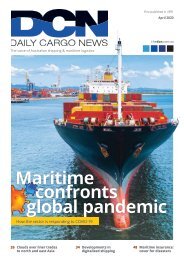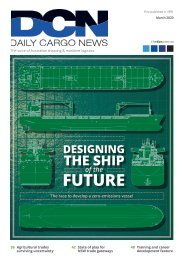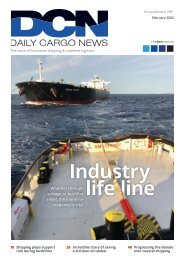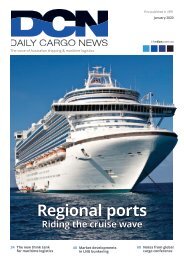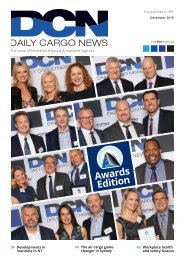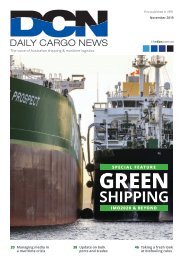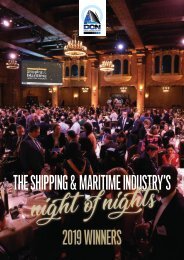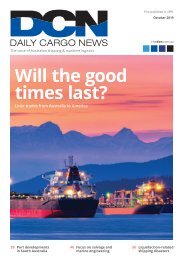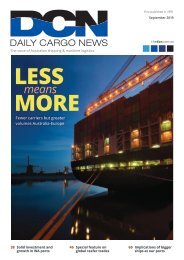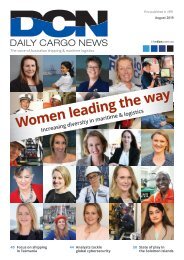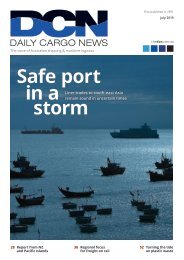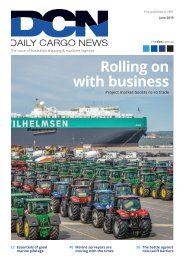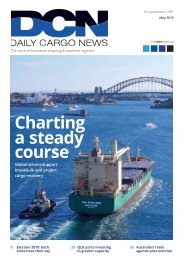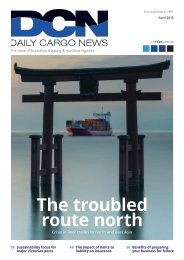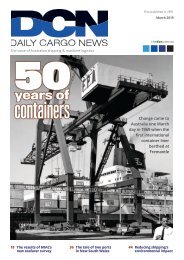DCN0718_Combined_150
Create successful ePaper yourself
Turn your PDF publications into a flip-book with our unique Google optimized e-Paper software.
PORT & CONTAINER EQUIPMENT<br />
“When Patricks years ago put<br />
Fisherman Island into place, the pressure<br />
really was on DPWA to automate their<br />
terminal and offer a consistent service.<br />
“But then the pressure [was on] DPWA<br />
to do the next one as you go around the<br />
chain of ports in Australia and the same<br />
with Patricks. So it self-generates because<br />
the shipping lines need consistency.”<br />
Mr McLean continued, saying,<br />
“Shipping lines have to have that<br />
[consistency] to be efficient and we want<br />
goods that we’ve ordered… so the key to<br />
stevedores is building a very consistent,<br />
reliable, fast service for their clients.”<br />
Meanwhile, Maersk Line Oceania<br />
operations manager Stuart Jennings said<br />
in a high-cost country such as Australia,<br />
productivity and efficiency in every<br />
aspect of the whole cargo supply chain<br />
must be maximised.<br />
“Maersk Line welcomes close<br />
collaboration across the entire ecosystem<br />
of the supply chain – customers, shipping<br />
lines, port operators, container depots,<br />
freight forwarders and authorities - to<br />
ensure Australia remains competitive in<br />
the global marketplace,” he said.<br />
“We see plenty of opportunity for<br />
key stakeholders, both in Australia<br />
and globally, to work jointly on the<br />
development of digital solutions which<br />
support future industry efficiencies and<br />
customer benefits.”<br />
Above: Peter McLean, Kalmar Asia-Pacific<br />
senior vice-president<br />
Port operators and stevedoring companies are checking out the<br />
options available to them in terms of automated technology<br />
A recent trip to Webb Dock in<br />
Melbourne provided some insights into<br />
the future of automated technology on<br />
the waterfront.<br />
It was there that visitors were able<br />
to get a first-hand look at the Easy Mile<br />
EZ-10 vehicle, a driverless shuttle that<br />
allows people to safely move around<br />
the docks.<br />
The EZ-10 was in Melbourne for trials<br />
involving the EasyMile company and<br />
Melbourne International RoRo and<br />
Automotive Terminal.<br />
EasyMile business development and<br />
project delivery manager for the Asia<br />
Pacific, Adwait Kale, told Daily Cargo<br />
News a little about the concept.<br />
He explained how the first three<br />
prototypes were commercialised<br />
in Singapore in 2014 and are still in<br />
operations in Gardens by the Bay.<br />
The machines are manufactured<br />
by a car and minibus manufacturing<br />
company Ligier in the south of<br />
France. EasyMile in turn provided the<br />
automation technology.<br />
EASY MILE SHUTTLE<br />
OFFERS A SNAPSHOT<br />
OF THE FUTURE<br />
Mr Kale said the cost in Australia to<br />
buy an EZ-10 would be around $360,000<br />
plus importation costs.<br />
For hiring, the cost would vary, but<br />
he mentions it would be around $8000<br />
a month for a five-year lease.<br />
The EZ 10 carries 14 people and<br />
those who visited MIRRAT during the<br />
recent demonstration got a good feel<br />
for its steering and braking capabilities.<br />
MIRRAT head of commercial and<br />
stakeholder management Jed Smith<br />
said they partnered with EasyMile to<br />
better understand the technology, how<br />
it works, how it performs in a dynamic<br />
environment and how they could design<br />
yard infrastructure to cater for such<br />
vehicles in the future.<br />
“The real benefit of these trials for<br />
us is to gain some exposure to this<br />
technology and begin building our<br />
knowledge on how it works and what<br />
are its requirements,” Mr Smith said.<br />
The unit and the EasyMile team<br />
arrived onsite on Tuesday, 5 June for<br />
three days of tests at MIRRAT.<br />
BLOCKCHAIN<br />
No article in 2018 would be complete<br />
without discussing blockchain, and Mr<br />
McLean said it did not yet keep him<br />
awake at night.<br />
“But again, it also is going to be part of<br />
our world,” he said.<br />
“It is something that we either will<br />
start to develop ourselves or we will<br />
partner with people; of course and that’s<br />
really what blockchain is all about as well.<br />
“So again it’s coming, and that’s why<br />
I think anyone who doesn’t open their<br />
doors and partner will be left behind in<br />
this industry.”<br />
ICHCA Australia director Peter van<br />
Duyn helped organise the Global Shippers<br />
Forum and agreed the trends influencing<br />
automation were of great significance.<br />
“Automation is very important, as<br />
labour costs are only going to go higher,”<br />
Mr van Duyn said.<br />
“But it’s also about safety. We’ve had<br />
incidents recently where people were hurt<br />
on the waterfront.<br />
“Had there been automation, you<br />
would have had damage but no injuries.”<br />
Mr van Duyn said automation<br />
would not necessarily be implemented<br />
everywhere overnight, but would happen.<br />
He noted Mr McLean’s comments<br />
about sharing technology.<br />
“It’s interesting because some<br />
companies may feel they have a<br />
commercial advantage, a bit like Tesla<br />
or Uber, and are reluctant to give up too<br />
much information,” he said.<br />
“But if there is some sharing of<br />
ideas there could be benefits for the<br />
waterfront overall.”<br />
Kalmar<br />
44<br />
First published in 1891<br />
July 2018 thedcn.com.au



